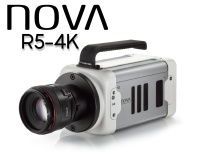- Description
- Specifications
- Videos
The FASTCAM NOVA R2 brings together unique CMOS image sensor technologies and extensive high-speed digital imaging expertise to provide a camera with the flexibility to be used in a wide variety of applications. The FASTCAM NOVA R2 offers 12-bit image recording rates up to 1,440 frames per second (fps) at 4-megapixel image resolution, and shutter speeds to 2.7µs. Recording rates to 100,000fps are available at reduced image resolutions. All of this available from a camera that is rugged, compact, lightweight and provides the best light sensitivity in its class.
Standard features of the FASTCAM NOVA R2 include an internal mechanical shutter to allow remote system calibration, memory segmentation that allows recording into one memory partition while downloading from another, and compatibility with a number of industry standard lens formats to allow the use of Nikon G-Type, C-mount and Canon EF lenses.
The FASTCAM NOVA R2 also features a “sealed body” design that prevents dust and corrosive particles from contaminating sensitive electronics.
An optional FASTDrive SSD can be used for the download of images at up to 1GB per second.
Intuitive and feature rich Photron FASTCAM Viewer (PFV) software is included with each FASTCAM NOVA R2 camera. Also included is a Photron Device Control SDK that allows integration of the camera with user-specific software, and libraries for controlling the camera within a MATLAB® or LabView environment.
| 64 GB | |
|
|
| High Resolution | |
| CMOS |
Related products
Export Disclaimer: Some goods on this site may be subject to US Export Regulations. Buyer agrees as one of the terms of purchase not to export such goods without having obtained and executed proper export licenses from the United States Government. Learn more.
 We offer a large variety of high speed cameras and brands that cover a large variety of applications.
We offer a large variety of high speed cameras and brands that cover a large variety of applications.
Photron has consistently expanded their range of high speed cameras to support the advancement of photo optics and electronic technologies, contributing to the progress of research and development in the fields of digital imaging and slow motion analysis. They cater to various markets including microfluidics, military testing, aerospace engineering, automotive, broadcast, particle image velocimetry (PIV), digital image correlation (DIC), ballistics testing, and more. As the leading global market provider of high-end, high-speed cameras, Photron continues to innovate and develop state-of-the-art products that are well-suited for demanding high-speed applications in industries such as automotive, military, aerospace, medical, scientific research, development, and manufacturing.
AOS Technologies is at the forefront of the industry as a premier producer of exceptional high-speed cameras and imaging systems. Our cutting-edge technology is utilized across the globe in challenging environments where precise and accurate high-speed recordings are essential. Our high-speed cameras offer the ability to capture intricate details of impacts, providing profound visual insights into accidents and events. These cameras are indispensable in various sectors such as industrial, automotive, defense, and space applications. AOS high-speed cameras deliver unparalleled insights into rapid mechanical movements, playing a fundamental role in facilitating accurate motion analysis.
Shimadzu ultra high-speed cameras feature the fastest cameras on the open market capable of motion sequences at ten million frames-per-second and 10 nanosecond shutter speeds. Medical science and engineering have made significant advancements thanks to visualization technology. For instance, we have seen the development of microscopes that can magnify observations of microscopic phenomena that are invisible to the naked eye. Additionally, X-ray inspection systems have allowed us to observe images using light at wavelengths that are imperceptible to us, and infrared cameras have provided further insights. Our eyes are limited in capturing events that occur in less than 50 to 100 milliseconds. Therefore, the use of high-speed video cameras has become essential to record these rapid occurrences and then play them back at a slower rate for visualization purposes. Serving as the go-to tool for visualizing ultra high-speed phenomena, the Hyper Vision high-speed cameras have played a crucial role in enhancing our understanding across various fields.





